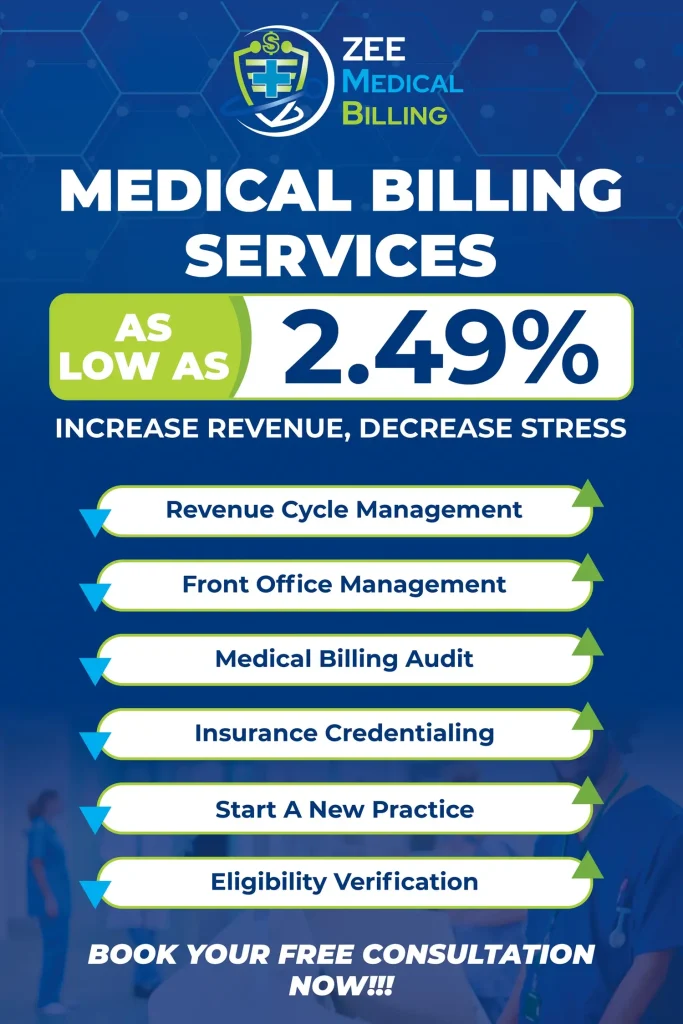Medical credentialing is a foundational part of modern healthcare. It ensures that physicians, nurse practitioners, and other healthcare providers are qualified, verified, and authorised to deliver care within their respective scopes. Whether you’re starting a private practice, joining a group, or expanding your insurance partnerships, understanding the medical credentialing process is essential.
In this guide, we’ll walk through what medical credentialing is, why it matters, and how it works, especially in the context of provider enrollment and insurance participation.
What Is Medical Credentialing?
Medical credentialing is the process of verifying a healthcare provider’s education, training, experience, and licensure. It is required before a provider can bill insurance companies, work with hospitals, or practice in most healthcare settings.
Key Components:
- Education verification (medical school, residency, fellowship)
- State licensure confirmation
- Board certification status
- Malpractice history and insurance
- NPI (National Provider Identifier) registration
- DEA license (if applicable)
Why Credentialing Is Important?
Credentialing protects patients, ensures regulatory compliance, and enables providers to receive reimbursement from insurance companies. Without proper credentialing, a provider cannot join insurance panels or legally render services in many cases.
Read More: Process for Insurance Credentialing for Therapists and Doctors
Benefits of Proper Credentialing:
- Enables reimbursement from Medicare, Medicaid, and private payers
- Increases patient trust and organizational reputation
- Helps meet hospital or clinic onboarding requirements
- Prevents legal or financial liability from unverified providers
Who Needs Credentialing?
Any licensed healthcare provider who wants to:
- Accept insurance
- Work at a hospital or facility
- Join a medical group
- Be listed in payer directories
This includes:
- Physicians (MDs and DOs)
- Nurse practitioners (NPs)
- Physician assistants (PAs)
- Behavioural health professionals
What Does a Credentialing Company Do for Providers?
Credentialing can be time-consuming and detail-oriented. Many providers and practices hire credentialing companies to manage this process.
Services Offered:
- Completing and submitting applications to payers
- Following up with insurance companies
- Handling re-credentialing and expirations
- Managing credentialing documents and compliance deadlines
Steps in the Credentialing Process
Credentialing isn’t just one form—it’s a multi-step process that can take weeks or months, depending on the payer and the type of provider.
Step-by-Step Overview:
1. Information Gathering
- Collect all personal, licensure, and education documents
- Confirm NPI, DEA, malpractice insurance, and board certifications
2. CAQH Profile Completion
- Most payers require a completed and attested CAQH profile (for physicians and certain provider types)
3. Application Submission
- Submit applications to insurance companies or credentialing platforms.
4. Follow-Ups and Communication
- Credentialing companies or office managers follow up with payers to track the status of applications.
5. Approval and Enrollment
- Once approved, the provider is added to the payer’s directory and can begin submitting claims for payment.
Types of Credentialing Services
1. Insurance Credentialing
- Focused on enrolling providers with insurance carriers
2. Hospital Credentialing
- Used to gain admitting privileges at a hospital
3. Medicare and Medicaid Credentialing
- Ensures participation in government-sponsored health plans
4. Ongoing Re-Credentialing
- Required every 2-3 years by most payers
- Includes license updates, continuing education, and updated malpractice info
Credentialing Challenges and Delays
Credentialing isn’t always straightforward. Common issues include:
- Incomplete applications
- CAQH profile inconsistencies
- Delayed responses from payers
- Miscommunication between providers and payers
Working with credentialing professionals or utilizing a centralized credentialing management system can help minimize these delays.
Read More: Health Insurance Credentialing: A Guide for Providers
Cost of Credentialing Services
Credentialing costs vary based on provider type, the number of insurance networks, and whether services are performed in-house or outsourced.
Factors Influencing Cost:
- The number of players who applied to
- New vs. existing providers
- Add-on services (e.g., re-credentialing reminders)
Medical Credentialing Software and Platforms
Many healthcare organizations use credentialing software to track and manage the credentialing lifecycle.
Features to Look For:
- Document storage and reminders
- Real-time application tracking
- Integration with CAQH and payer databases
- HIPAA-compliant data handling
Frequently Asked Questions
1. What is physician credentialing?
Physician credentialing is the process of verifying a doctor’s qualifications and authorizing them to practice with insurance companies or hospitals.
2. How long does the credentialing process take?
It typically takes 60–120 days, depending on the payer, provider type, and the completeness of the application.
3. Can I credential myself?
Yes, providers can complete the credentialing process themselves, but it’s time-consuming and often better handled by a credentialing specialist or company.
4. Do I need to re-credential regularly?
Yes. Most payers require re-credentialing every 2-3 years to maintain active participation status.
5. Is credentialing required for private pay-only practices?
No. Credentialing is primarily for insurance billing. However, it may still be needed for hospital access or referrals.
Final Thoughts
Medical credentialing plays a critical role in ensuring quality, compliance, and access in healthcare delivery. From private practices to large hospital systems, accurate and timely credentialing enables providers to focus on patient care while maintaining compliance with insurance and regulatory standards.
If you’re setting up a new practice, hiring new providers, or expanding your payer list, understanding the full credentialing lifecycle is essential. For more details, visit Medical Insurance Credentialing Services USA.
Need Expert Medical Billing Services?
Zee Medical Billing offers professional billing solutions tailored to healthcare providers nationwide. In addition to providing top-tier support from our main office, we proudly serve clients in 19 states: Illinois, Indiana, California, Kentucky, New York, Washington, Georgia, Alabama, South Carolina, Texas, Pennsylvania, Ohio, New Hampshire, Nevada, Massachusetts, Hawaii, Arizona, and Colorado. Whether you’re looking to streamline your revenue cycle or improve claims accuracy, you can reach out to us to learn more about how we can support your practice.









